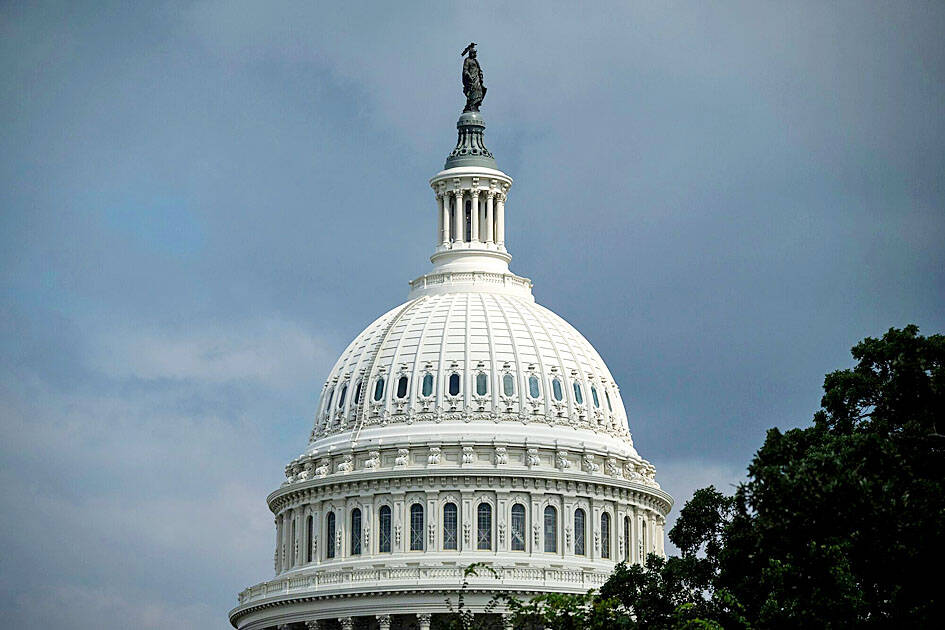The US House of Representatives on Wednesday passed its version of the National Defense Authorization Act (NDAA), rejecting amendments that would have barred funding for Taiwan and Ukraine.
The bill would authorize nearly US$900 billion in military spending and feature a plan to streamline the defense acquisition process.
The vote on the proposal for spending was 231 to 196, similar to last year’s, largely along party lines.

Photo: Bloomberg
All but four Republicans backed the bill and all but 17 Democrats opposed, mostly due to amendments addressing divisive social issues.
The measure includes a 3.8 percent pay raise for soldiers and plans to improve the military’s acquisition system, including by shortening approval timelines and increasing artificial intelligence research.
Democrats and Republicans largely banded together to defeat amendments from Representative Marjorie Taylor Greene that would have prohibited funding for Ukraine and eradicated funding for the Taiwan Security Cooperation Initiative, the military news Web site Breaking Defense reported.
The Ukraine funding prohibition was shot down in a 60-to-372 vote, while the Taiwan amendment was defeated nine to 422, the report said.
The US Senate is considering its version of the bill, which authorizes US$32 billion more in spending than the House measure.
If that passes, the House and Senate Armed Services committees must reach a compromise that would need to pass both chambers before it can be sent to the White House for US President Donald Trump to sign into law or veto.

The Taiwanese passport ranked 33rd in a global listing of passports by convenience this month, rising three places from last month’s ranking, but matching its position in January last year. The Henley Passport Index, an international ranking of passports by the number of designations its holder can travel to without a visa, showed that the Taiwan passport enables holders to travel to 139 countries and territories without a visa. Singapore’s passport was ranked the most powerful with visa-free access to 192 destinations out of 227, according to the index published on Tuesday by UK-based migration investment consultancy firm Henley and Partners. Japan’s and

NATIONAL SECURITY THREAT: An official said that Guan Guan’s comments had gone beyond the threshold of free speech, as she advocated for the destruction of the ROC China-born media influencer Guan Guan’s (關關) residency permit has been revoked for repeatedly posting pro-China content that threatens national security, the National Immigration Agency said yesterday. Guan Guan has said many controversial things in her videos posted to Douyin (抖音), including “the red flag will soon be painted all over Taiwan” and “Taiwan is an inseparable part of China,” while expressing hope for expedited “reunification.” The agency received multiple reports alleging that Guan Guan had advocated for armed reunification last year. After investigating, the agency last month issued a notice requiring her to appear and account for her actions. Guan Guan appeared as required,

Japan and the Philippines yesterday signed a defense pact that would allow the tax-free provision of ammunition, fuel, food and other necessities when their forces stage joint training to boost deterrence against China’s growing aggression in the region and to bolster their preparation for natural disasters. Japan has faced increasing political, trade and security tensions with China, which was angered by Japanese Prime Minister Sanae Takaichi’s remark that a Chinese attack on Taiwan would be a survival-threatening situation for Japan, triggering a military response. Japan and the Philippines have also had separate territorial conflicts with Beijing in the East and South China

A strong cold air mass is expected to arrive tonight, bringing a change in weather and a drop in temperature, the Central Weather Administration (CWA) said. The coldest time would be early on Thursday morning, with temperatures in some areas dipping as low as 8°C, it said. Daytime highs yesterday were 22°C to 24°C in northern and eastern Taiwan, and about 25°C to 28°C in the central and southern regions, it said. However, nighttime lows would dip to about 15°C to 16°C in central and northern Taiwan as well as the northeast, and 17°C to 19°C elsewhere, it said. Tropical Storm Nokaen, currently